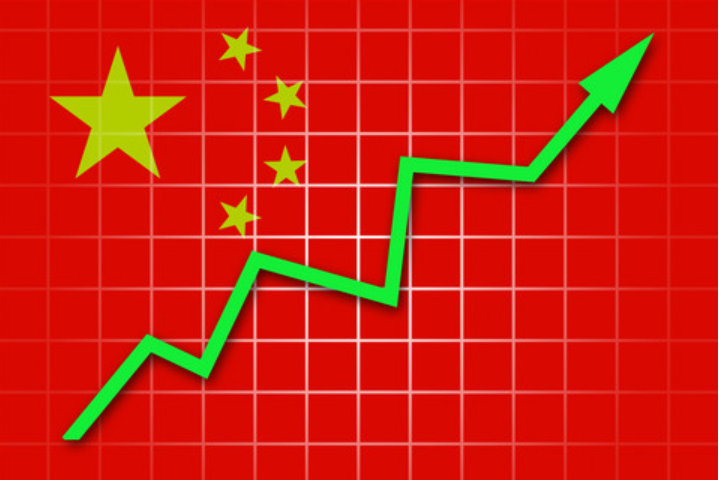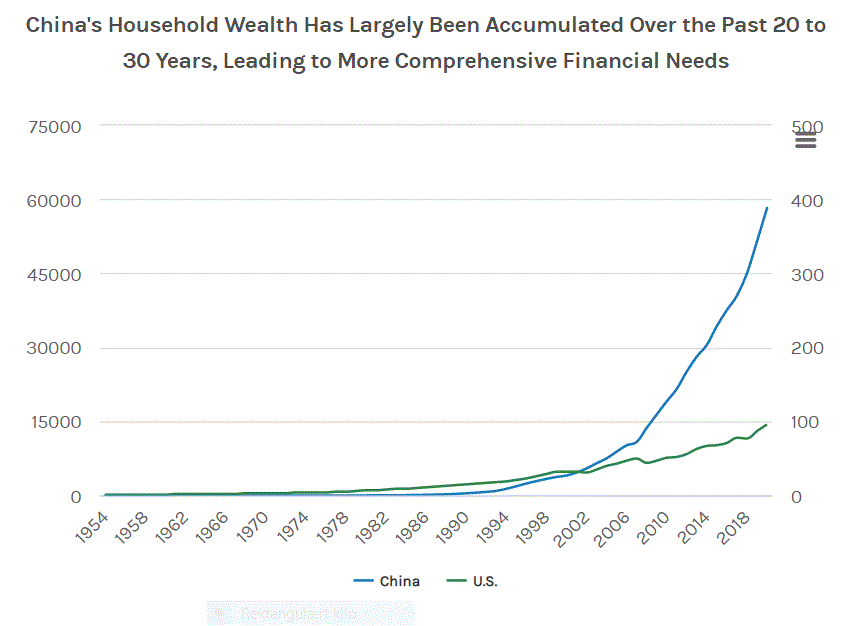Morgan Stanley har opgjort det kinesiske investormarked til en værdi på 16.000 milliarder dollar (16 trillioner dollar eller 100 trillioner RMB), dvs. som et marked, der er parat til investeringsrådgivere. De private husholdningers finansielle værdi er steget eksplosivt og er nu fire gange så stor som de amerikanske husholdningers formue. Det marked, der er egnet for wealth management, kan tre-dobles til 2030. Det er så voldsomt, at det i sammenligning med selv USA vil fremstå som sit helt eget marked, og det er opstået på kun 40 år. I 1980 var indtjeningen pr. indbygger på 195 dollar (som på et u-landsniveau), men i 2020 var det på 10.500 dollar og ventes at blive på 20.000 dollar i 2030. Om et år eller to vil det være på 12.690 dollar, og så er Kina blevet et høj-indkomstland, ifølge Verdensbanken. Det er et marked, som udenlandske finansrådgivere ikke kan ignorere, skriver Morgan Stanley, selv om mange i disse måneder ser på Kina med skepsis. Globale finanshuse kan se frem til årlige forvaltningshonorarer på 2.000 milliarder dollar. Kina har ikke selv oparbejdet den forvaltnings-ekspertice, som vestlige forvaltere har.
Four Megatrends Fuelling China’s $16 Trillion Wealth Management Opportunity
Household wealth in China is poised to grow faster than its GDP and at a time when wealthy and mass-affluent investors are hungry for comprehensive financial advice.
It’s no secret that household wealth in China is driving its economic expansion—with forecast GDP averaging 4.5% annually through the end of this decade. What many investors may not fully appreciate, however, is how quickly household income is compounding—and what that means for China’s asset management and wealth advisory industry.
To understand the magnitude of China’s rise over the past 40 years, consider this: Per capita income totaled $195 in 1980, $959 in 2000 and $10,500 in 2020. It’s now on track to reach $20,000 by 2030, well above the World Bank’s $12,690 threshold for “high income” economies.
“In fact, we believe China’s wealth-to-GDP has already reached an inflection point as household wealth is compounding at rates faster than GDP,” says Richard Xu, Chief China Financial Analyst at Morgan Stanley.
In a recent collaborative Blue Paper, Morgan Stanley analysts working across disciplines and regions examined the investment opportunity from multiple angles. While investors may draw parallels to other economies, the sheer size of China’s market and the evolutionary speed of its asset management industry puts it in a category of its own.
All told, China’s surge in household wealth could translate to more than $16 trillion (100 trillion renminbi) of inflows to the wealth management market, just when high-net-worth and mass-affluent households are seeking more comprehensive financial advice.
This could bring household financial assets to more than RMB424 trillion, where close to RMB170 trillion could be addressable by wealth managers, potentially tripling industry revenue by 2030. That translates into a historical growth opportunity for China’s domestic financial services sector, as well as global players, who could see portfolio inflows of as much as $2 trillion, Morgan Stanley estimates.
It’s early days yet, but here are four megatrends shaping China’s wealth and asset management industry over the next decade.
1. Newly Minted Millionaires Need Financial Advice
An astounding share of China wealth has been accumulated in a very compressed period—and, until recently, entirely in the absence of a local wealthy advisory industry.
Many high-net-worth individuals in China are first-generation entrepreneurs who need comprehensive advice on everything from asset management to estate planning. “We believe the mid- to high-end market will remain the sweet spot for more sophisticated wealth managers, such as leading shareholding banks, that are capable of sourcing quality assets and offering high-touch services,” says Xu.
At the same time, investors shouldn’t overlook asset allocation services that cater to middle-income and mass-affluent households in China, where income is more evenly distributed than in other markets. “Leading retail banks and large, payment-focused online wealth-management platforms are best positioned for this shift,” Xu adds.
2. Advisory Fees Could More Than Triple by 2030
Against the backdrop of rising wealth and demand for financial advice, the business model is also shifting from one based primarily on product distribution to an advisory-fee model.
“We believe the biggest opportunity is in wealth allocation and financial advisory, which were practically nonexistent prior to the financial market cleanup,” says Xu, whose team forecasts that fees could represent 24% of asset-management revenues by 2030, up from virtually nothing today. “The issuance of financial advisory licenses could reshape the fee streams in wealth management, leading to a potential tripling of the revenue opportunity by 2030.”
It’s worth noting that the growth of China’s wealth management industry doesn’t necessarily translate to new money pouring into stocks. “We anticipate only a modest shift in household financial assets from deposits to investment products, owing to China’s unique capital demand structure, which will provide leading retail banks a natural competitive advantage,” he says.
3. Global Leaders Have the Most to Gain
The turning point in China’s wealth management industry corresponds with broader trends in wealth and asset management. Namely, continued global consolidation will likely drive higher-fee income growth for industry leaders.
At the same time, Chinese investors will look to diversify their assets—triggering an estimated $2 trillion in outflows from China to other markets over the next 10 years. To put this in context, this is just shy of the current market cap of Apple.
“We think one of the biggest opportunities for global firms will come from the spillover of China’s household financial assets into offshore equity markets,” says Betsy Graseck, Global Head of Banks and Diversified Finance at Morgan Stanley Research. “Firms that offer the best access to equity products, as well as comprehensive global products, will take a greater share of China’s wealth opportunity.”
4. Recent Concerns Could Be a Buying Opportunity
International investors are, understandably, skeptical about the Chinese market, given lingering geopolitical tensions. This year’s regulatory reset around certain sectors—such as technology, education and, most recently, cryptocurrency—could give additional pause.
Still, speed bumps and detours in China’s economic development have always been part of the roadmap. Investors with a long-time horizon may want to consider their strategic approach. “Time and again, concerns about China’s development have led to compelling investment opportunities,” says Chief China Financial Analyst Xu. “We believe wealth and asset management is one of these opportunities.”












